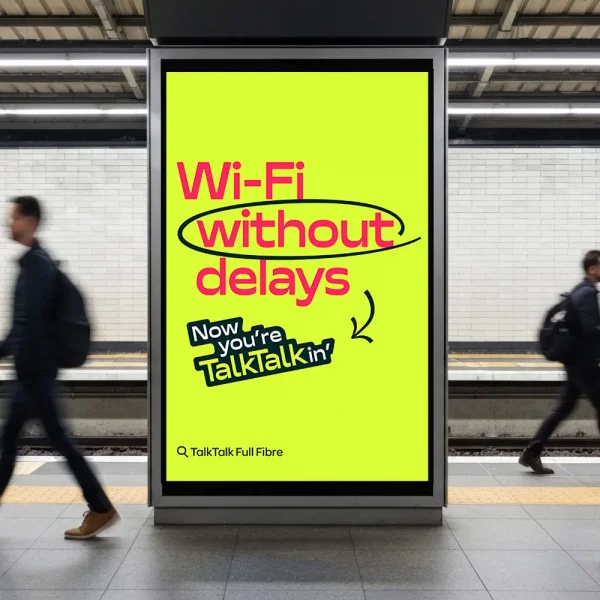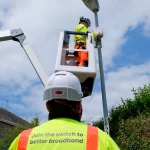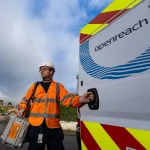TalkTalk Survey Claims Wi-Fi is Most Popular UK Name for Broadband UPDATE

A new online survey of 2,000 UK adults, which was commissioned by Axicom on behalf of broadband ISP TalkTalk and conducted by OnePoll, claims to have found that “Wi-Fi” is the “most popular name” for home internet connections. One third of those asked said they use Wi-Fi to describe their internet connection, pipping “broadband” and “internet” to the post.
In addition, some 76% of respondents say they “confidently understand” the term Wi-Fi, although only half of those asked could confidently say they understand the term “fibre“, a name frequently used by telecoms companies to describe broadband products. Finally, 6 in 10 respondents agree that technology-related information is difficult to understand due to jargon.
Sadly, TalkTalk hasn’t released the full results of their survey, which makes it a bit tricky to give this the full context. But it does seem like an attempt by the ISP to help justify their focus on the use of “Wi-Fi” to describe broadband connectivity as part of their recent brand refresh (here and here), despite the fact that doing so may not be entirely correct and could reinforce a misconception.
Advertisement
Steve Wallage, TalkTalk’s Product and Propositions Director, said:
“Wi-Fi is a staple in all our homes, yet as an industry we haven’t kept up with the times when we talk to our customers. At TalkTalk, we’re shifting to talk about Wi-Fi more and more, as it’s the connectivity – making sure streaming or browsing is seamless – that matters most for our millions of customers.
Our latest research tells us that people prefer to communicate in the same way that they speak, without jargon, and our industry should reflect that. We know we’re not perfect, and we have much to do, but this is the first step in delivering a Better Way to Wi-Fi for customers who just want transparency and information they can confidently understand. And this builds trust between us and our customers too.”
The term “Wi-Fi” is of course also still jargon. But for the avoidance of doubt, in most homes Wi-Fi connectivity represents a wireless local area network (WLAN) connection that comes from your router and / or booster (repeaters / extenders etc.), which can also be used to help distribute the broadband internet connection from your ISP. But broadband can also be distributed from the router via wired (LAN) links too.
One problem with using Wi-Fi to describe broadband is that all sorts of other connectivity and performance issues can impact wireless links. But ISPs might not always want to associate that with the fixed line connectivity they provide, since to do so risks inheriting lots of additional support problems that exist outside of their realm.
UPDATE 1:17pm
TalkTalk has kindly provided ISPreview with the full survey questions and results. We note that the first question was constructed in a very broad way and queried quite generally about “connectivity at home“.
Advertisement
- Which word do you use to describe connectivity at home (e.g. what you use to get online, stream TV / films, play video games online, etc.)
- Wi-Fi (first – 33%)
- Internet (second – 31%)
- Broadband (third – 22%)
- Wireless (fourth – 4%)
- Connectivity (fifth – 4%)
- T’internet (3%)
- Not sure (2%)
- Other (0%)
- Which of the following terms can you confidently say you understand?
- Wi-Fi (first – 76%)
- Wireless (second – 72%)
- Router (third – 67%)
- IP address (fourth – 61%)
- 3G/4G/5G (fifth – 54%)
- Fibre (53%)
- VPN (51%)
- Gigabyte (49%)
- Hub (44%)
- Booster (41%)
- Dongle (41%)
- Ethernet (40%)
- Fixed line (39%)
- HTTP (36%)
- Bandwidth (36%)
- Mbps (32%)
- LAN (30%)
- ISP (29%)
- Extender (20%)
- ADSL (16%)
- Latency (16%)
- FTTP (14%)
- Mesh (12%)
- FTTC (8%)
- Symmetrical speeds (8%)
- PSTN (6%)
- LLU (4%)
- To what extent do you agree with the following statements:
- It is important for companies to communicate in simple, clear language, free from any jargon. (88% strongly agree/agree)
- Jargon often makes me feel confused or overwhelmed. (62% strongly agree/agree)
- I often find technology-related information difficult to understand due to jargon. (59% strongly agree/agree)
Mark is a professional technology writer, IT consultant and computer engineer from Dorset (England), he also founded ISPreview in 1999 and enjoys analysing the latest telecoms and broadband developments. Find me on X (Twitter), Mastodon, Facebook, BlueSky, Threads.net and Linkedin.
« Ookla Launch Scheme to Help People Verify if Places Offer Good Broadband






















































Much to the irritation of technical support people such as myself. On a regular basis I have to explain the difference and then ask for clarity on the issue someone is reporting. Drives me mad!
Wrongfully describing things drives you mad? They should have added a final question then…
“What drives you mad when you call customer support? 1 reading from a script 2 thinking they know more than you do because they’re reading from a script or 3 both 1 and 2
I guess 3 will be the highest rated answer! As an ex IT Tech I’m in the number 3 spot, and I really wished they would have a extension to higher command, but sadly we who know what we’re talking about have to jump into our own pre scripted yeah and no answers before they get that fed up they finally pass you to real tech support!
But I digress, this issue that Talk Talk have shown is an advertising issue, plain and simple, should be banned for even mentioning increasing your broadband speeds using WiFi etc etc… Broadband is copper or Hybrid FTTC and Fibre is FTTP or don’t fart or blink else you’ll miss the page load up!
Advertising is everything… Yet we allow it to distort the truth…
That is the nature of technical support no matter what domain the service is provided to.
People being wrong, even in large numbers, isn’t a reason to describe products inaccurately.
Hoovers and vacuum cleaners spring to mind
In short summary(sic), from past history(sic) when the uneducated buzz word is king they revert back(sic) to the lowest common denominator seeing it as a safe haven(sic) for their product. So if you could just enter your PIN number(sic) to login to customer support they’ll ensure there are no unexpected surprises(sic) with your WiFi connection to the www internet.
What terminology would you use then in a marketing campaign aimed at the general public?
Please do not use any established marketing terms such as “full-fibre”, “Hub” or “Wi-Fi”.
It’s the same as those suddenly saying “inbox me” instead of private messages.
I know a few people call it the WiFi in the same way as inbox me. For some it’s definitely because they don’t understand technology, for others it’s the “cool way” to describe broadband. probably never used an ethernet cable in anger either.
Doesn’t really bother me either way.
Not surprising, I bet most users don’t have anything connected to the ethernet ports on their routers. There can’t be many houses wired up for ethernet.
agreed, my flat wasn’t being circa 2005 built but. I have since added some ethernet and other bits to it. Mainly because Sky stream runs alot better on ethernet even though oddly the puck’s ethernet is 10/100 as is my sony TV from 2022….
Most TVs only have 10/100 ports. Even 4K video only uses about 30Mbps so it isn’t really necessary. It’s the solidity of wired connections rather than the raw speed.
Don’t know about you but I call it “Mysterious messages from the Air Gods who are often unknowingly upset by Humans and refuse to appear when summoned”.
Love it 🙂
An educational FAIL! But it matches my experience. When someone says their “Wi-Fi is being upgraded” I always ask them to clarify. It’s an opportunity to discover what they really mean, and indeed what they really want. For example, if they’re upgrading their “Wi-Fi” to 2Gbps, I feel compelled to point out that they’ll need to, erm, entirely replace their “Wi-Fi” with 2.5G ethernet in order to actually achieve those speeds 🙂
The use of the “Wi-Fi” marketing term is itself an “educational fail” which most people now seem to accept without thinking.
@Far2329Light: TalkTalk must have been oblivious to that fact, as their new marketing campaign clearly shows!
@Fibre Scriber:
Indeed, but TalkTalk are using the term in a marketing campaign,not as part of an educational exercise.
Someone said to me ‘It’s the people installing the wi-fi’. Referring to Openreach digging up the road.
No wonder consumers are also confused about Fibre. Same probably applies to the nonsense of various “fast” labels that have been pushed to consumers over the years. If the industry and regulator dumbs everything down no wonder consumers are clueless.
Kelloggs & co might have you think otherwise, but old-fashioned porridge is best for fibre.
As the full-fibre roll-out nears completion, the size of the bit pipe is irrelevant. It is the capability that is important.
With TalkTalk recently selling off a good chunk of its heritage network customers, it is nearer or even at the point where its customers are on full-fibre.
And I’m betting if they’ve sampled 2,000 customers and 4% of them know what LLU means, that’s probably about 70 or so of them just answering yes to every question. Was one of them David Cameron saying what he thought lol meant?
Read that 4% stat while thinking ‘tf were they asking’
I’m old enough to remember when Staycation meant staying at home during a holiday rather than a holiday in the UK.
A “Staycation” has always included holidays within the UK.
I see that while “Internet” is just second to “WiFi” in describing connectivity at home, if you include “T’internet” it becomes the top answer of 34%.
Presumably TalkTalk surveyed in Yorkshire to get “T’answer” they wanted.
Didnt need a survey for this, the fact internet based smart products are labelled as wifi products (incorrectly) suggests this was done because people are used to calling it wifi.
It’s the way people speak now, another example would be, “my phones died” — when what they really mean is, their battery has gone flat, in the majority of cases anyway. 🙂
I (think) I generally use the term broadband when referring to a home (or small business) internet connection… but the term “broadband” itself is jargon – arguably particularly so when it is referring to internet access/connectivity.
I think this excerpt from the Wikipedia article on ‘broadband’ lays things out quite well:
“The term [broadband] became popularised through the 1990s as a marketing term for Internet access that was faster than dial-up access (dial-up being typically limited to a maximum of 56 kbit/s). This meaning is only distantly related to its original technical meaning.”
The campaign is a step in the right direction.
As the full-fibre roll-out nears completion, the marketing messages will have to be refined – away from the bit pipe and towards the benefits, capabilities and convenience of the user.
So now they call their internet service “Wi-Fi”, now they will provide equipment that can sustain the advertised bandwidth using Wi-Fi in the whole house, right? Or will they say if I sign up for a faster package I will need to use a “Wi-Fi cable” to access the full bandwidth?
They are not advertising an internet service; they are advertising the convenience of connectivity within the home.
I had “TalkTalk Sucks” When i left they tried to avoid refunding the money they owed me saying “We can hold it for when you come back to us” Yeah right, id rather join the Amish than TalkTalk ever again
Society’s race to the bottom to accommodate the lowest common denominators continues unabated it seems. Boils my p*** when someone asks what the best Wi-Fi locally is.
Well that’s because of the clowns that advertise internet services as WiFi when it is in fact NOT WiFi.
How the advertising standards don’t collar companies for that is beyond me as it is factually incorrect.